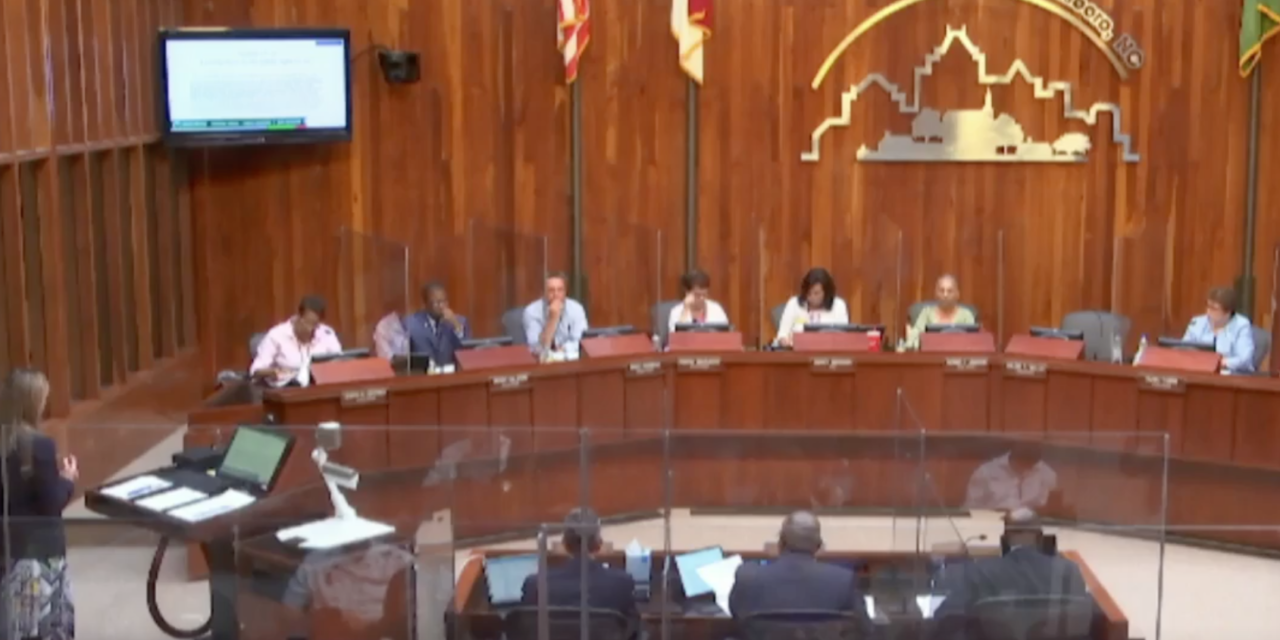Downtown Greensboro should be cleaner, quieter and easier to get around if ordinance modifications discussed at the Thursday, Sept. 1 work session are approved.
The City Council appeared to reach consensus on approval of all the changes proposed by Assistant City Attorney Andrea Harrell.
The main pushback came, not from a member of the City Council, but from City Manager Tai Jaiyeoba, who suggested the city staff be given more time to study the proposed ordinance modifications to make certain they didn’t conflict with any City Council policies.
If the ordinance modifications do conflict with a city policy, then the policy can be modified also, or the city can do what it usually does and ignore the policy.
Mayor Nancy Vaughan made it clear that she did not share Jaiyeoba’s concerns and requested that the ordinance modifications be on the agenda for the Tuesday, Sept. 20 meeting.
Harrell explained to the City Council that most of the modifications involved taking ordinances that are so vague that they are difficult to enforce and making them specific and enforceable. Modifications were proposed to four ordinances
- Section 16-10: “leaving items in the public right of way”
- Section 18:44: blocking public passageways
- Section 18-50: per se unlawful noise
- Chapter 17 Nuisances
The modification about leaving items expands “public right of way” to include “park, or other public place or space in the City” and defines what cannot be left as, “any object, substance or waste” with a long list of items that would be included.
Harrell said that the city didn’t plan to charge many people with this misdemeanor but hoped that education and signage would result in more compliance. The ordinance also gives the city the right to remove materials that are found in violation of the ordinance.
Blocking public passageways is more clearly defined as requiring 36 inches of clear space for people to pass through and adds that entrances and exits to buildings cannot be blocked.
Harrell said this applied whether the building was occupied or vacant.
The unlawful noise ordinance proposed modification prohibits the operation on public property of any sound amplifier that can be heard at a distance of 50 feet.
Vaughan said that High Point’s similar ordinance put the limit at 30 feet and the City Council appeared to agree to lower the distance to 30 feet.
The proposed modification to the ordinance dealing with nuisances would require retail establishments with more that 10 shopping carts “to develop and implement a specific plan to retrieve its shopping carts that are found throughout the city.”


It seems to me that City Manager Tai Jaiyeoba just likes to be difficult. With his previous track record elsewhere, he should ‘sit down and shut up.’
The City manager is an African socialist who was instrumental in establishing a huge BLM mural in Charlotte, and who sees everything in racial terms.
He’s worried about the obnoxious black drivers whose ear shattering “music” they deliberately crank up, so as to be as offensive and Ghetto as possible. He’s on their side – because of the color of their skin.
You’re a freaking racist
Don’t you see who the issue is becoming? Doe the city manager work for council or the other way around?
Looks like council is just rebranding the laws they took off the books that controlled the homeless population Downtown. The amount of homeless people living in the parks, block businesses entrances, defecating on the sidewalks, etc is the true problem.
We just can’t have anything nice!
None of this is enforceable. For example, a 50′ periphery limit for any kind of noise (music)?
Sounds good, so the council is off the hook.
So the council is trying to fix the ordinances that the council created? Nice.
More evidence of Mandate Mayor and her cabals inability to tolerate the sight of the extremely destitute and struggling among us. To criminalize being penniless and to confiscate clothing and blankets from folks struggling to survive is evil. Especially in the shadow of a 100 million dollar Performance Arts Palace. Maybe try being a good human being and start by opening public restrooms
Cannot print what I am thinking. Shame on the chicken city council!!!
I live in the Westerwood neighborhood. Because of my osteoarthritis, I usually use my mobility scooter through the neighborhood. As much as I appreciate the beautification of the neighborhood, there are some sidewalks that are covered with foliage that not only blocks vision, but pathways, too. The city needs to take a tour of the streets in Westerwood, from Hillside Street to Westover Terrace, from W Friendly to Lake Daniel Park. Also the sidewalks could use some repairs, especially the corner curbs. They’re not handicapped functional.